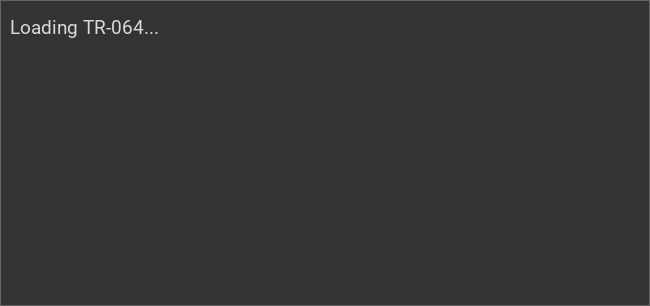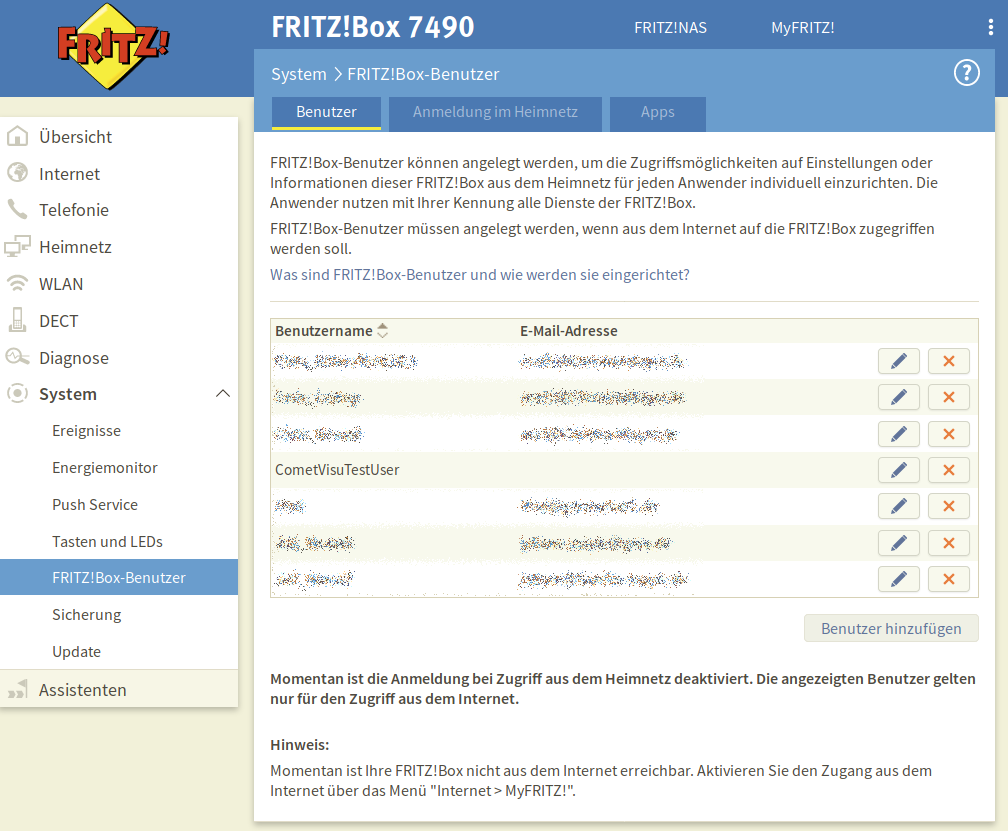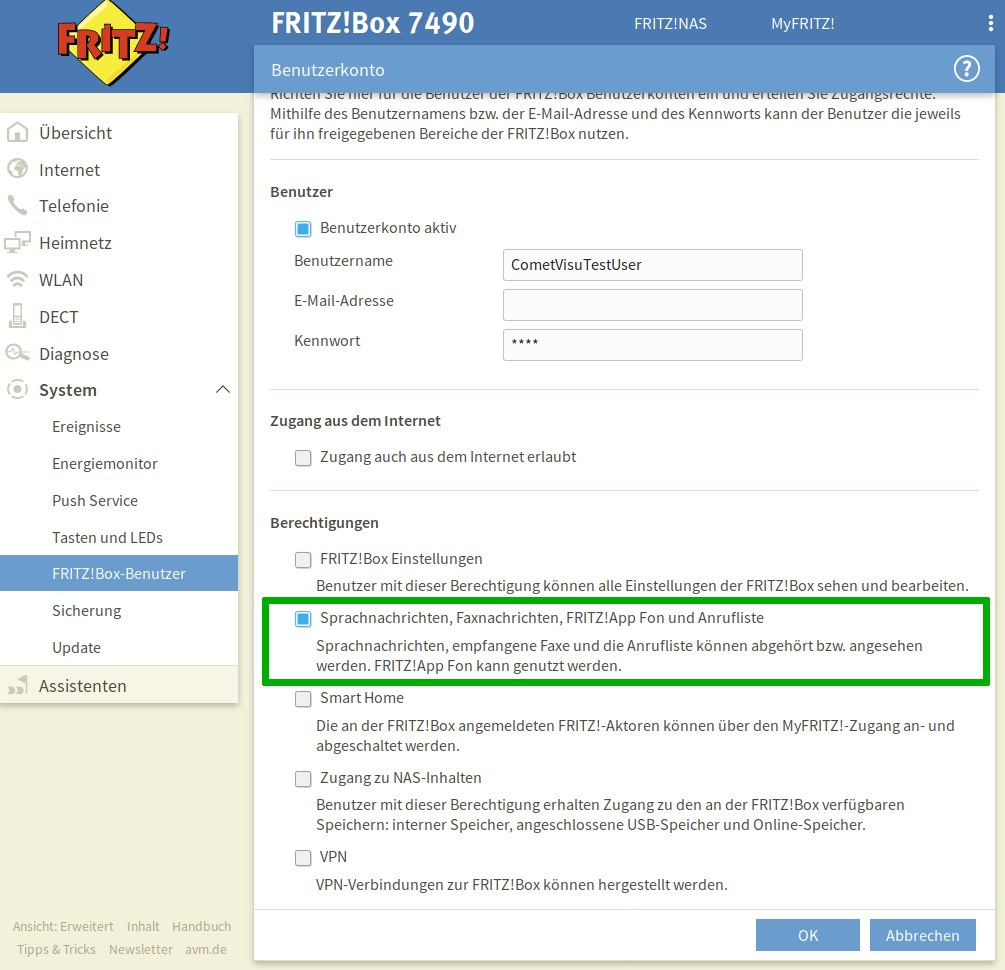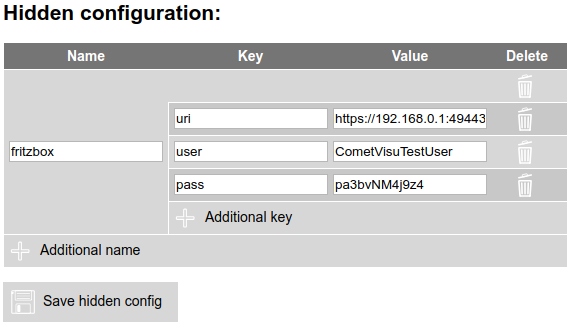Caution
This is the documentation for the current development branch of the CometVisu. It is possible that some of the described features are not yet available in the current release.
Also there might be lots of errors in this documentation as some parts of the content have been translated by an online translation service.
The tr064 Plugin
Todo
automatic screenshot creation (from dummy data)
Description
The plugin is an interface to routers that implement the TR-064 protocol, like
the widely used Fritz!Box. The calllist widget from this plugin displays
a call list that contains the name of the callers (when known to the router)
as well as the records of the answering machine.

Settings
For a general understanding of how the configuration files are structured and what elements and attributes are it is recommended to read this section first: Basics.
The behaviour and appearance of the powerspectrum plugins can be influenced by using certain attributes and elements. The following tables show the allowed attributes and elements and their possible values. The screenshots show, how both can be edited in the editor.
Attributes underlined by ….. are mandatory, all the others are optional and be omitted.
Allowed attributes in the calllist-element
Element |
Attribute |
|||
|---|---|---|---|---|
Name |
Content |
Description |
||
calllist |
device |
string |
ID/Name of the device as used in the hidden configuration. |
|
max |
decimal |
Maximum number of entries to fetch from the router. |
||
columns |
string |
By semicolon separated list of column types (allowed types: caller, date, name, nameOrCaller, tam, type) |
||
TAM |
string |
Icon for telephone answering machine. |
||
TAMColor |
string |
|||
TAMwait |
string |
Icon for waiting for telephone answering machine. |
||
TAMwaitColor |
string |
|||
TAMplay |
string |
Icon for playing the telephone answering machine. |
||
TAMplayColor |
string |
|||
TAMstop |
string |
Icon for stopping the telephone answering machine. |
||
TAMstopColor |
string |
|||
typeIncoming |
string |
Icon for incoming call. |
||
typeIncomingColor |
string |
|||
typeMissed |
string |
Icon for missed call. |
||
typeMissedColor |
string |
|||
typeOutgoing |
string |
Icon for outgoing call. |
||
typeOutgoingColor |
string |
|||
typeActiveIncoming |
string |
Icon for active incoming call. |
||
typeActiveIncomingColor |
string |
|||
typeRejectedIncoming |
string |
Icon for rejected incoming call. |
||
typeRejectedIncomingColor |
string |
|||
typeActiveOutgoing |
string |
Icon for active outgoing call. |
||
typeActiveOutgoingColor |
string |
|||
typeUnknown |
string |
Icon for unknown call type. |
||
typeUnknownColor |
string |
|||
refresh |
decimal |
Sets the update rate for the call list in seconds |
||

Allowed child-elements and their attributes
Element |
Attribute |
|||
|---|---|---|---|---|
Structure |
Name |
Content |
Description |
|
|
colspan |
decimal |
Amount of columns this widget should be wide. |
|
colspan-m |
decimal |
Overrules the amount of columns on a medium screen. |
||
colspan-s |
decimal |
Overrules the amount of columns on a small screen. |
||
rowspan |
decimal |
Amount of rows this widget should be high. |
||
x |
string |
Horizontal position of the widget for 2D pages. |
||
x-s |
string |
Horizontal position of the widget for 2D pages on a small screen. |
||
x-m |
string |
Horizontal position of the widget for 2D pages on a medium screen. |
||
y |
string |
Vertical position of the widget for 2D pages. |
||
y-s |
string |
Vertical position of the widget for 2D pages on a small screen. |
||
y-m |
string |
Vertical position of the widget for 2D pages on a medium screen. |
||
z |
string |
Reserved for future use. |
||
width |
string |
Width for the widget for 2D pages. |
||
width-s |
string |
Width for the widget for 2D pages on a small screen. |
||
width-m |
string |
Width for the widget for 2D pages on a medium screen. |
||
scale |
true or false |
Enable/Disable scaling layout values relative to backdrop on 2d pages (default: true). |
||
scale-s |
true or false |
Enable/Disable scaling layout values relative to backdrop on 2d pages on a small screen (default: true). |
||
scale-m |
true or false |
Enable/Disable scaling layout values relative to backdrop on 2d pages on a medium screen (default: true). |
||
Element |
Attribute |
|||
|---|---|---|---|---|
Structure |
Name |
Content |
Description |
|
|
name |
string |
Name of the icon registration. |
|
type |
string |
|||
flavour |
string |
Selection of a display variant. See also Flavour. |
||
color |
string |
Color of the icon in CSS notation (e.g. #1188FF). |
||
styling |
string |
Change the color of the displayed value depending on its value. See also Styling |
||
class |
string |
Add this value to the CSS class so that it can be formatted by a user provided style sheet. |
||
|
string |
Text to display a label for the widget. |
||
Element |
Attribute |
|||
|---|---|---|---|---|
Structure |
Name |
Content |
Description |
|
|
transform |
string |
Transformation of the bus system value to be shown. |
|
mode |
disable, read, write or readwrite |
“disable” deactivates the communication, “read” will only fetch data from the backend, “write” will only write to it and an address with “readwrite” will be both, read from and written to. |
||
variant |
string |
|||
format-pos |
decimal |
Position for format string when multiple addresses are used. |
||
selector |
string |
Only MQTT: JSON selector |
||
qos |
decimal |
Only MQTT: QoS |
||
retain |
true or false |
Only MQTT: retain flag |
||
ignore-error |
true or false |
Only MQTT: ignore decode errors. |
||
|
string |
The GA (like: 12/0/7) for KNX-backends, the item name for openHAB-backend or the MQTT topic |
||

Element in the editor
XML syntax
Alternatively it is possible to manually add the tr064 plugin entry to the visu_config.xml.
Caution
In the config only the UTF-8 charset is allowed. So an editor that is set to UTF-8 mode must be used.
The minimale example code for the calllist widget to create the shown screenshot is:
<?xml version="1.0" encoding="UTF-8"?>
<meta>
<plugins>
<plugin name="tr064" />
</plugins>
</meta>
<page name="TR-064" type="text">
<calllist device="fritzbox">
<label>calllist</label>
</calllist>
</page>

calllist, einfaches Beispiel
...
<meta>
<plugins>
<plugin name="tr064"/>
</plugins>
</meta>
...
<calllist device="fritzbox">
<label>calllist</label>
</calllist>
Prerequisites / setup of the server
To be able to use the plugin the server must support PHP with the extension of the SoapClient package.
On debian based systems it means that the php-soap package must be
installed.
Setup of the Fritz!Box
To get access to the call list of the Fritz!Box a user with according permissions must be created (or an existing user account must be used). This is possible on the user page:

The user itself needs the rights to access the call list:

The plugin needs to know the credentials to be able to use this user. This uses the “hidden configuration” infrastructure which can be accessed by the CometVisu manager [2].

The used name must be given in the calllist widget in the attribute device.
The key and value pairs of the hidden configuration” are:
Key |
Value |
Example |
|---|---|---|
uri |
The URI to access the TR-064 interface |
|
user |
The username for the TR-064 access |
|
pass |
The password for the TR-64 access |
|
selfsigned |
Allow self signed certificates when |
|
Apart from the manager it is possible to edit the file config/hidden.php
manually and add a line like:
<?php
// File for configurations that shouldn't be shared with the user
$hidden = array(
'fritzbox' => array('uri' => 'https://192.168.0.1:49443/', 'user' => 'CometVisuTestUser', 'pass' => 'pa3bvNM4j9z4')
);
?>
Hint
When the connection to the router is secured by SSL (i.e. the URI starts with
https) it is usual that selfsigned must be set to true as a
router in the home network will work usually with a self signed certificate.
The error message
{"faultstring":"Could not connect to host","faultcode":"HTTP"} can be a
hint that selfsigned should be set to true.
Footnotes